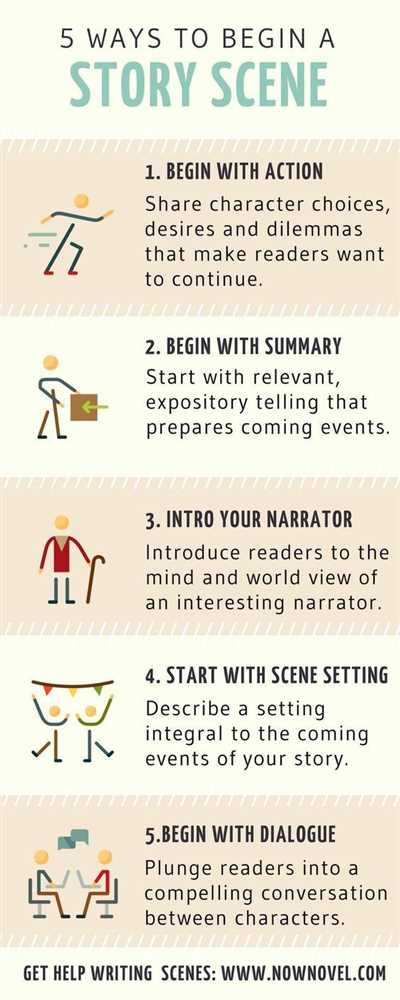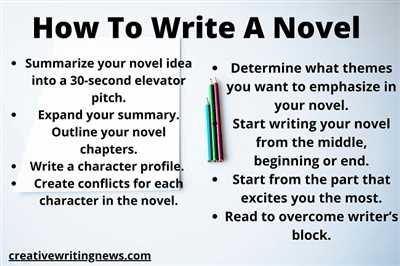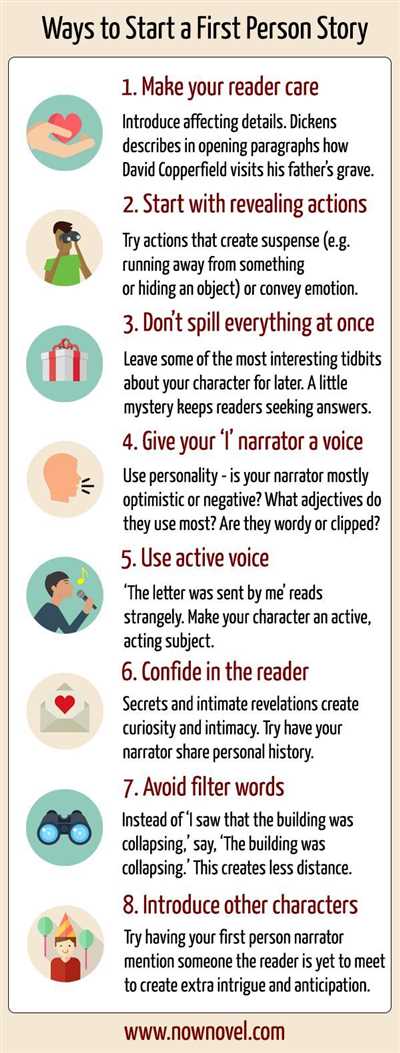
Starting fiction writing can be a daunting task, but with a good plan in place, you can overcome any obstacles that come your way. One of the first things you should do is find a genre that interests you. Whether it’s fantasy, romance, or mystery, choose a genre that you’re passionate about. This will make the writing process much more enjoyable.
Once you’ve decided on a genre, it’s time to start thinking about your characters. Who are they? What are their goals, dreams, and fears? Knowing your characters inside and out will allow you to create realistic and relatable individuals that your readers will connect with.
Next, you need to come up with a solid plot. What is the main conflict of your story? What events will take place to drive the narrative forward? Take the time to brainstorm and outline your ideas, and then choose the best one. Your plot will be the backbone of your story, so make sure it’s strong and engaging.
Now that you have your genre, characters, and plot in place, it’s time to start writing. Many writers find it helpful to start with a strong hook in the first paragraph. This will draw the reader in and make them want to continue reading. You can also try starting in the middle of the action to grab their attention right away.
When writing the first draft of your novel, don’t worry about getting every sentence perfect. Just get the words down on paper. You can always go back and revise later. The most important thing is to keep moving forward and not get hung up on little details.
After you’ve finished your first draft, it’s time to revise and edit. This is where you can start to fine-tune your story and make it the best it can be. Look for any plot holes or issues with character development. Make sure every scene serves a purpose and moves the story forward.
Once you’re happy with your manuscript, it’s time to start thinking about publishing. There are many options available, including finding a literary agent or submitting directly to publishers. Do your research and choose the path that works best for you. Remember, rejection is just part of the process, so don’t get discouraged if you receive some negative responses.
In the end, the most important thing is to stay true to yourself and your writing. Don’t try to imitate other authors or follow trends. Write the story that you want to tell, and trust that there are people out there who will appreciate it. Starting fiction writing can be hard, but with perseverance and a love for storytelling, you can achieve your dreams of being an author.
So, if you’re ready to embark on the exciting journey of fiction writing, don’t wait any longer. Sit down, grab a pen, and let your imagination run wild. The road ahead may be long and challenging, but the rewards will be worth it. Good luck!
News for Authors

In the world of fiction writing, there is always something new happening. Whether you’re a seasoned author or just starting out, staying up-to-date with the latest news and trends in the industry is essential. Here are some exciting updates for authors:
1. Bestsellers: Have you ever wanted to know what makes a book a bestseller? The answer may be simpler than you think. Literary agent Jane Doe recently replied to a reader’s question on Biographile, saying, “The best novels are those that hook readers from the first sentence.” So, make sure to put some thought into your opening line!
2. Finding your genre: Knowing which genre to focus on can be a crucial step in the writing process. If you’re not sure where to start, take a look at what you enjoy reading the most. What kind of books or movies do you gravitate towards? This can give you a clue as to what genre might be a good fit for your writing.
3. Characters: One of the main issues many writers face is creating compelling characters. If you’re struggling in this area, try thinking of your characters as real people. What are their goals, fears, and motivations? By delving deeper into their backstories and personalities, you’ll be able to create more well-rounded and believable characters.
4. Setting: The setting of your novel is an important element that can greatly impact the story. Whether it’s a bustling city or a small town, make sure to describe the environment in vivid detail. This will allow your readers to fully immerse themselves in the world you’ve created.
5. Plotting: Some writers prefer to outline their entire novel before starting, while others like to let the story unfold as they go. There is no right or wrong way to approach plotting, so find a method that works best for you. Just remember to keep the reader engaged with an intriguing plot.
6. Traditional vs. self-publishing: With the rise of self-publishing platforms, authors now have more options than ever before. While traditional publishing still has its benefits, self-publishing allows you to have more control over your work and reach a wider market. Consider your goals and weigh the pros and cons before making a decision.
7. Working with an agent: If you’re looking to get your book published traditionally, finding a literary agent can greatly increase your chances. Agents have connections in the industry and can help guide you through the publishing process. Do some research and find the best agent who aligns with your writing goals.
8. Stay inspired: Writing can be a solitary endeavor, but it doesn’t have to be lonely. Connect with other writers, join writing groups or workshops, and attend literary events. Surrounding yourself with like-minded individuals can provide inspiration, support, and valuable feedback.
Remember, there’s no one-size-fits-all approach to fiction writing. It’s a journey that each writer must navigate themselves. So, take what works for you and leave what doesn’t. Embrace the process, keep honing your craft, and most importantly, have fun along the way!
Who will be the main character in your novel

When you are starting to write a fiction novel, one of the first things you need to think about is who will be the main character. This is a crucial decision that will shape your entire story, so it’s important to give it some serious thought.
The best main characters are those that can immediately draw readers in and make them want to keep reading. They should be relatable, interesting, and have a clear goal or conflict to overcome. The main character is often the one that readers will root for, so it’s important to make them likable and sympathetic.
As a writer, you have full control over who the main character will be. This means you can create a character who is the complete opposite of yourself, or you can base them partially off of your own experiences and personality.
In some cases, authors may choose to have multiple main characters, each with their own storylines that eventually converge. This can add complexity to your narrative and allow you to explore different perspectives and themes.
Knowing the setting is also important when deciding on a main character. The setting can heavily influence the type of character that will resonate best with readers. For example, a character set in a bustling city might be very different from one set in a small town.
Consider the genre you are writing in as well. Different genres have different expectations when it comes to main characters. A fantasy novel might have a protagonist who is a hero with extraordinary powers, while a crime novel might have a detective as the main character.
Ultimately, the main character should be someone that will keep readers engaged and invested in the story. They should be someone that readers root for, empathize with, and want to accompany on their journey throughout the novel.
So, who will be the main character in your novel? The answer to that question will be different for every writer, and there’s no one right answer. The most important thing is to choose a main character that feels authentic and compelling to you, as the writer. If your character feels real to you, they are more likely to feel real to your readers.
Starting a novel can be a hard process, but finding the right main character is a crucial first step. The main character is the one who will lead the story and hook readers right from the first sentence. If your main character doesn’t work, the rest of the novel may suffer.
Remember, your main character is the face of your novel. They will be on the cover, in the blurb, and featured prominently in the marketing materials. They are the one readers will associate with your story, so it’s important to make them memorable and captivating.
Thanks to Biographile, we have a few tips from famous authors to get you started:
1. Focus on character: “For me, plot is always subordinate to character. Good stories are always about people.” – Donna Tartt
2. Introduce your character: “To me, character names are more important than all those subsequent paragraphs a writer will create, one hopes, in a kind of hypnotic trance.” – Richard Flanagan
3. Find the character that speaks to you: “It’s hard for me to describe what makes someone more interesting than the next person, but you know it when you see it. You don’t have to possess all the ‘attractive’ characteristics, but there should be something that grabs you.” – Jodi Picoult
Remember, the main character is the heart and soul of your novel. Take your time in choosing the right one, and don’t be afraid to let them evolve and surprise you as the story progresses. Happy writing!
Put a character in a setting
One of the most important steps in the fiction writing process is putting a character in a setting. Authors know that the setting is more than just a placeholder, it’s a crucial element that sets the tone and atmosphere of the story.
In movies, the setting might be established through a single scene, but in a novel, authors have the luxury of exploring different settings throughout the narrative. However, finding the right setting for your story can be a daunting task.
Here are three steps to help you choose the perfect setting for your fiction writing:
- Know your character: Before you start writing, it’s important to have a clear understanding of your main character. Think about their personality, background, and motivations. This will help you choose a setting that aligns with their story.
- Consider the plot: The setting should also support the plot of your story. Think about what kind of setting will allow your character to face challenges and overcome obstacles. The setting can even become a character itself, influencing the actions and decisions of your protagonist.
- Create a vivid description: Once you’ve chosen a setting, it’s important to describe it in a way that will immerse your reader. Use descriptive words and sensory details to bring the setting to life and make it feel real.
Remember, the setting doesn’t have to be a physical place. It can also be a specific time period, a social environment, or even a fictional world. The key is to choose a setting that enhances the story and keeps the reader engaged.
By putting a character in a setting, you’re giving your story a solid foundation from which to build. So, the next time you’re struggling to start your fiction writing, remember to consider the setting. It could be the answer you’ve been looking for.
Publish your novel
So you’ve finished writing your novel. Congratulations! But what’s next? How can you get your work out into the world and in the hands of eager readers? Publishing your novel is the next important step in the writing process, and here are some steps to help you get started:
- Know your genre: Before you start thinking about publishing, it’s important to know what genre your novel falls into. This will help you understand your target audience and market your book accordingly.
- Research: Take the time to research different publishing options, including traditional publishing houses, small presses, or self-publishing. Each option has its own pros and cons, so consider which one is the best fit for your novel.
- Find an agent: While not all authors choose to work with an agent, having one can greatly increase your chances of getting published. Agents have connections in the industry and can help guide you through the publishing process.
- Prepare your manuscript: Make sure your novel is in the best possible shape before submitting it to publishers. This means editing and revising your work multiple times, and possibly even seeking feedback from beta readers or hiring a professional editor.
- Write a killer query letter: A query letter is a brief introduction to your novel that you send to agents or publishers. It should include a concise summary of your story, information about yourself as a writer, and why you think your book would be a good fit for their publishing house.
- Submit your manuscript: Once you have your query letter and manuscript ready, start submitting to agents or publishers. Be prepared for rejection, as it’s a normal part of the process. Keep track of your submissions and any feedback you receive.
- Consider self-publishing: If traditional publishing doesn’t work out, self-publishing is another viable option. With self-publishing, you have full control over the publishing process and can reach a wide audience through online platforms.
- Build your author platform: Whether you choose traditional or self-publishing, it’s important to build an author platform to connect with readers. This includes having a website, blog, or social media presence where you can engage with your audience and promote your book.
Remember, publishing a novel is a challenging and sometimes lengthy process. It’s important to approach it with patience, perseverance, and a willingness to learn. Good luck on your publishing journey!
8 responses
Starting a novel can be a daunting task, but there are many ways to approach it. Some writers like to take the time to plan out their story in detail, while others prefer to jump right in and begin writing. Here are 8 responses from authors on how they think is the best way to start writing fiction:
- Take time to think about the story: Before you even put pen to paper, it’s important to think about the issues and themes you want to explore in your novel. Consider what’s important to you and what kind of story you want to tell.
- Start with a strong opening: The first few paragraphs of your novel are crucial for hooking the reader. Set the scene and introduce your characters in a way that captures their attention and makes them want to keep reading.
- Plot out your story: Some authors like to take the time to plan out their entire novel before they start writing, while others prefer to just have a rough idea of where the story is going. Find a method that works for you and stick with it.
- Focus on setting: The setting of your novel can be just as important as the characters and plot. Take the time to think about where your story takes place and how that location impacts the events of the story.
- Develop your characters: Spend some time getting to know your characters before you start writing. What are their names, backgrounds, and motivations? Knowing these details will help you bring your characters to life on the page.
- Find a publisher or agent: If you’re thinking of publishing your novel, it’s important to do your research and find a publisher or agent who specializes in your genre. Submitting your work to the wrong person can be a waste of time and effort.
- Don’t get bothered by rejection: Rejection is a part of the writing process, and many authors have faced it multiple times before finding success. Don’t let it get you down – keep submitting your work and improve with each rejection.
- Don’t think too hard: Sometimes, the more you think about the writing process, the harder it can be to get started. Don’t overanalyze or second-guess yourself – just sit down and begin writing. You can always edit and revise later.
Remember that there’s no right way to start writing fiction. Every writer is different, and finding your own process is key. The most important thing is to just start writing and see where the road takes you. Good luck!

